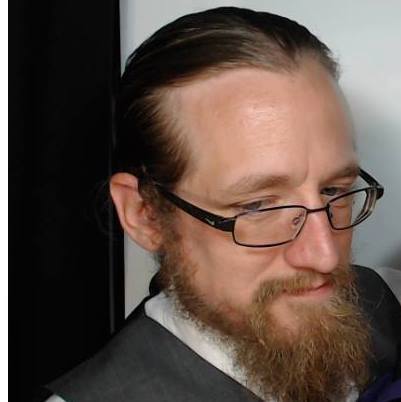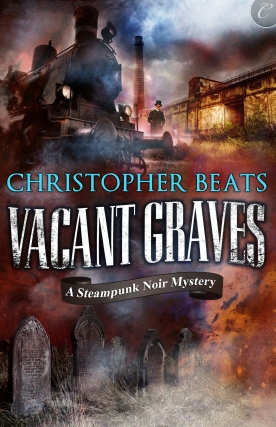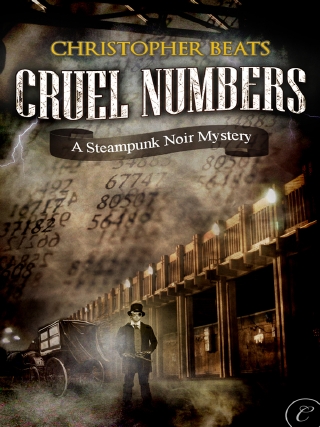This holiday season, I’ve decided to promote some of my writer friends and ask some of the questions that folks ask me. Today’s guest/victim is:
Christopher Beats
First, a little something about Christopher.
Christopher Beats is a starry-eyed idealist currently wandering the canals and boulevards of South Florida. He used to teach history at various levels and institutions but now focuses on writing beautiful lies.
At what age did you start writing or know that you wanted to write?
I’ve been writing and telling stories as long as I can remember. At some point in the fourth grade, I was scribbling away at this story and another kid saw it and was blown away by how long it was. Before that, I hadn’t really considered my ability to be special. By sixth grade, I was writing little novels and some other kids would read them. I can’t stress enough how much that early interest encouraged me on this path.
A big turning point came later, when I finished my MA in History. I’d sent stuff to publishers many times and considered myself a part-time author. But when I had to consider whether or not to start a PhD, it triggered a sort of epiphany. To put it bluntly, I realized I would rather fail as an author than succeed as a historian. I consider that a key turning point in any artist’s life–when they know that success in another field will always seem hollow. So I spent the next two years writing stories instead of doing research and the result was, among other things, Cruel Numbers and Vacant Graves.
Where do your ideas come from?
With my background in history, a lot of my ideas are inspired by actual events and historical trends. I enjoy worldbuilding because of my understanding of causal relationships. That’s what history is really about—teasing out which causes have which effect. I loved the old Marvel “What If?” comics and I think it shows in my writing. Researching history is fun, but I love to explore the fictional possibilities even more, which is why I am especially drawn to alternate timelines.
Do you plot out your stories or just make it up as you go?
There’s this sort of battle between the plotters and the free-wheelers or whatever they call themselves, epitomized in some of Stephen King’s advice, which is definitely more free-wheeling. Personally, I use both methods. Sometimes, an idea hits and I start writing before I know where it’s going to go. Other times, I carefully mold it in my head then put it down. Both have worked for me.
Do you listen to music while you write and if so, what do you listen too?
I try to get the ambiance right for each setting. So when I was hip-deep in the Magnocracy (or any time I’m feeling noir), I listen to Fiona Apple. Something about her songs really epitomizes Donovan Schist’s world. When I write fantasy, I go with Loreena McKennitt or Mediaeval Babes or even folk music. With cyberpunk or sci fi, Funker Vogt really sets the mood for me.
Which of your characters would you most like to meet in person? Which character of another author would you want to meet?
I would love to sit down over a cup of coffee with Donovan Schist and try to convince him that Eastern philosophy is worth his time. I suspect it would be a losing battle—he’s far too indoctrinated with Western thought.
For the characters of other authors, I’d love to meet Gandalf, Dumbledore, or Splinter (from Teenage Mutant Ninja Turtles). I love it when an author develops a convincing mentor. It’s a very compelling archetype.
How much do you write each day/week?
I try to write or edit every weekday. When my family or appointments allow it, I aim for three hours, preferably in the morning. I get a lot of interruptions, though, so it never feels like enough. I consciously started giving myself weekends off to avoid burnout. In some ways, being your own boss gives you a very harsh taskmaster.
Do you have a routine when you write?
Yes—it involves a lot of caffeine, either from black tea or coffee. I often lock myself in a room and put the iPod on as loud as it will go without breaking my concentration. Sometimes, I have to pace around to get the mood right in my head. For editing, I prefer quiet and will often hide in a corner of my public library.
Who were your inspirations?
I consider Ursula K. LeGuin and Roger Zelazny to be grandmasters of the craft. Their work refuses to be stuck in any one genre and, most importantly, their prose is magnificent. I am humbled whenever I read them. I also look to Dashiell Hammett and Raymond Chandler for inspiration. They were trailblazers who forged a unique American style that really embodied the twentieth century and told the world we had something to offer literature.
Favorite authors?
Roger Zelazny, Ursula K. LeGuin, Philip K. Dick, Neil Gaiman and Walter Jon Williams. I can be very picky when I read, but these authors have a large body of work that almost never disappoints.
What book do you read over and over the most?
Like a lot of people, I reread Lord of the Rings and Dune every few years. In my opinion, these books are good for your soul. I’m challenged each time I read them and find that my interpretation has deepened over the years. I also reread the Harry Potter series fairly regularly. The later books in particular really get me thinking.
Is there a book or book series that you recommend to people?
I would like to see more people read Dread Empire’s Fall and its sequels. Walter Jon Williams’ use of actual physics demonstrates that you can write a compelling story without giving up scientific accuracy. Rather than just wave a wand and say “artificial gravity!” he showed that inertia and other forces would create limitations and opportunities in space not unlike those in the Age of Sail. In fact, those books have always reminded me of Patrick O’Brian’s Aubrey-Maturin series.
How much of you is in your characters?
I think people would be surprised which characters I feel connected to. I try to put myself in every character, but especially villains. I believe in following the Batman paradigm of villainy. I’ve always liked how (in the animated series anyway) most of Batman’s enemies have a reason for what they do. So if I can, I make antagonists understandable, even sympathetic. Fiction is a good place to explore the dark side of one’s beliefs. It’s easy to caricature your political or idealogical opponents, but that’s a type of straw man attack, isn’t it? I’d much rather find out the pitfalls of my own philosophy than pillory ideas I don’t like. That said, sometimes I can’t help myself.
What genre do you prefer to write? To read?
I’ve found as I get older that genre matters less and less compared to plot, prose, and character development. I like authors who focus on those. That said, my favorites are noir, science fiction, and fantasy. I actually avoid reading whatever genre I’m writing, in part because I get sick of it. While I was deep in the Donovan Schist books, I couldn’t stand to read or even watch stuff about the 19th century or Steampunk. It was like I had gorged on ice cream and couldn’t eat it any more. Now that I’ve been away from the Magnocracy for a while, I’m happy to report I picked up Vermillion by Molly Tanzer and enjoyed it, so I guess my palate’s reset.
Do you prefer writing short stories or novels? And why?
I’m a novel writer. I have written many, many short stories, but inevitably they grow to the very border of novella or even spill over. Guess I’m long winded.
I’m also really big on character development, so for me, longer is better. I prefer TV series over movies for that reason. I like to see a long character arc, to really get in a person’s head and understand why they do the things they do.
What are you working on now?
I’ve been editing a pretty massive near-future science fiction piece which, like other works of mine, started out small and just got out of control. It’s been kind of intense, so for the moment I’ve taken a break to write some quick little stories in a fantasy universe. Not sure I plan on marketing them, but they were a nice diversion.
What 3 things do you feel every aspiring writer should know?
The terrible truth is you’ll spend more time editing than writing. Everything has to be perfect or an editor won’t even look at it. So any given project needs at least twice as much time on the rewrite/edit period as on the creation. This is a hard lesson because editing can be so tedious. The thing to understand is that this is a job, and like all jobs there are tasks which must be done, regardless of how fun or stimulating they are.
Another thing I tell people is to be aware of the process and use it to your advantage. I remember talking to this guy who couldn’t figure out how to start a novel and I told him to use “Once upon a time” if it would get the ball rolling. It sounds ridiculous, but you’re going to rewrite the beginning a hundred times anyway. A better opening may come later, when you know where the story is going to go. People need to understand that the rough draft is like an unfinished house—you can put up all the scaffolding you like as long as it comes down afterwards. I’m a really verbose guy and when I go back over my manuscript, I know I’m going to cut a third of what I’ve written, maybe more. That’s fine, because the extra words helped me get in the mood. They served an honorable purpose. When I cut them, I try not to feel guilty or foolish about it.
Finally, it should go without saying that you’re going to have to change. Unless you self-publish without getting any advice at all, someone is going to have a say in what you write. This is good and bad, but the important thing is that you learn when to take advice and when not to. You’ll also have to learn to pick your battles. That’s a big one. Even the gentlest editor is going to ask you to change things. Just remember that they’re trying to make it more comprehensible, that the editor is your ally, more or less.
These are not easy lessons and I do not claim to have mastered them myself. I just know it would’ve helped me to learn them a decade ago.
How do you use social media in regards to your writing?
Awkwardly. There’s a lot of pressure on writers to create a “brand” and to put themselves out there all the time. This is difficult for me. I have young children, so my time is limited. I’ve also noticed, both from my own attempts and by reading others, that blogging is a specialized form of writing, just like poetry or novels. Some people have really mastered it. I’m not one of those people.
Thanks Christopher. To learn more about him, click below:




